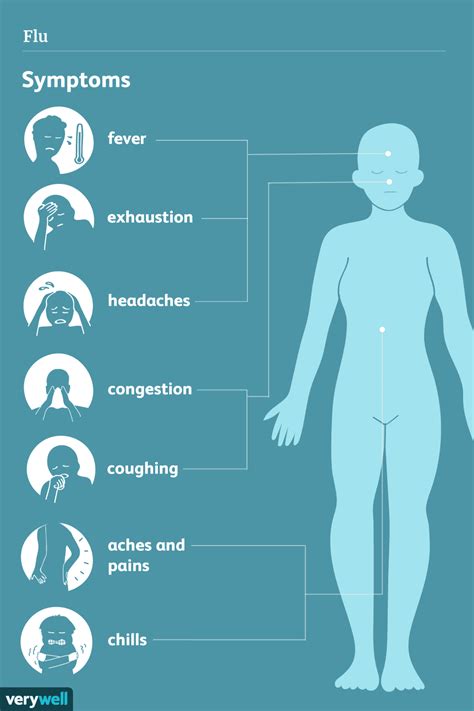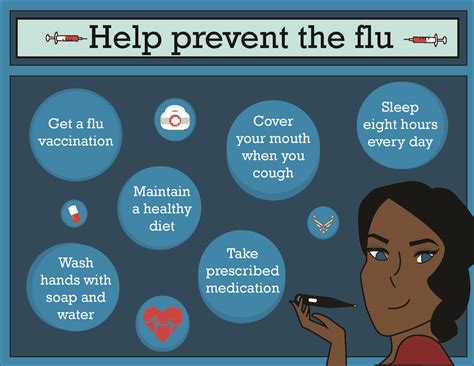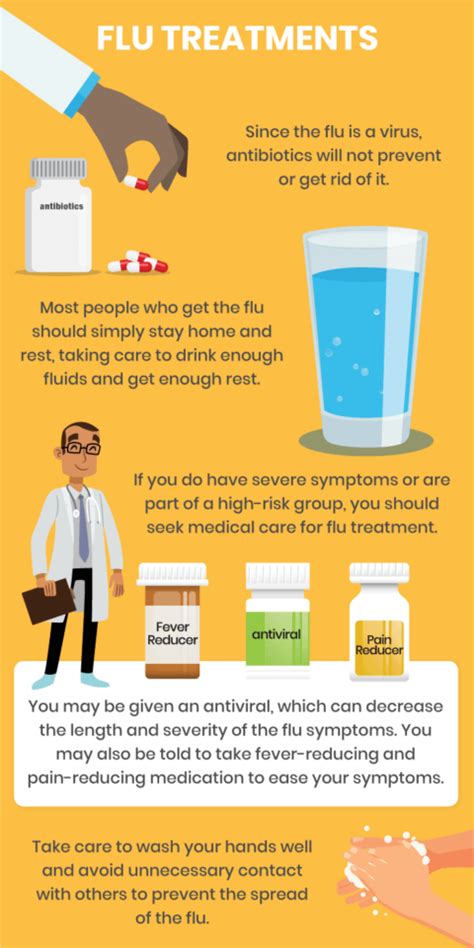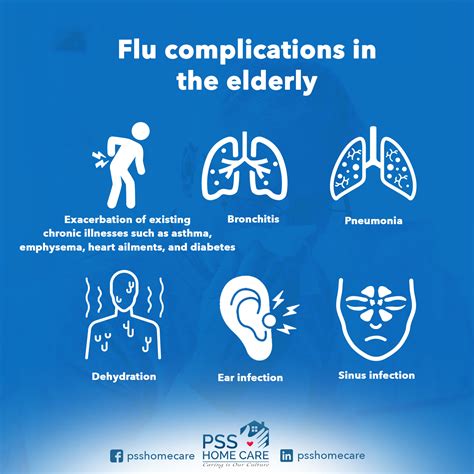The flu, also known as influenza, is a highly contagious respiratory illness that affects millions of people worldwide every year. It is essential to recognize the symptoms of the flu to seek medical attention promptly and prevent complications. The flu can cause mild to severe illness, and in some cases, it can lead to life-threatening conditions such as pneumonia, bronchitis, and sinus infections. In this article, we will delve into the 7 flu symptoms that you should be aware of, and provide you with valuable information on how to manage and prevent the flu.
The flu is a significant public health concern, and it is crucial to take preventive measures to avoid getting infected. The flu virus spreads quickly through the air when an infected person talks, coughs, or sneezes, releasing droplets that contain the virus. These droplets can land in the mouths or noses of people nearby, infecting them with the flu. The flu can also spread by touching surfaces or objects that have the flu virus on them and then touching your mouth, nose, or eyes.
The flu symptoms can vary from person to person, but there are common symptoms that most people experience. Recognizing these symptoms is vital to seeking medical attention promptly and preventing complications. The flu symptoms can be mild or severe, and they can last for several days or even weeks. It is essential to be aware of the 7 flu symptoms to take preventive measures and manage the illness effectively.
Introduction to Flu Symptoms
The flu symptoms can be divided into two categories: common symptoms and severe symptoms. Common symptoms of the flu include fever, cough, sore throat, runny or stuffy nose, muscle or body aches, headaches, and fatigue. Severe symptoms of the flu include difficulty breathing, chest pain, severe headache, confusion, and seizures. It is crucial to seek medical attention immediately if you experience any of the severe symptoms.
7 Flu Symptoms to Watch Out For
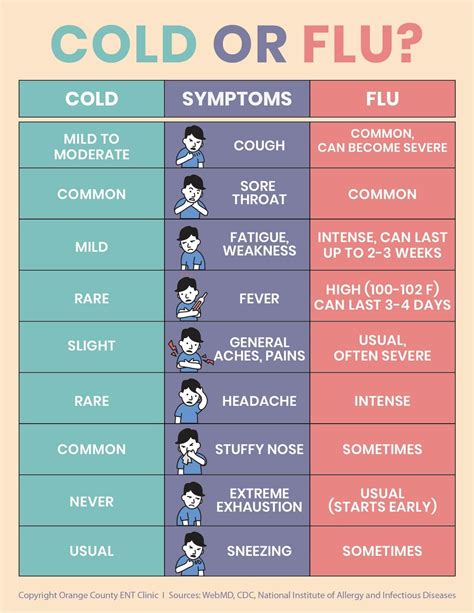
Here are the 7 flu symptoms that you should be aware of:
* Fever: A fever is a common symptom of the flu, and it can range from mild to severe. A fever is usually accompanied by chills, sweating, and a general feeling of being unwell.
* Cough: A cough is another common symptom of the flu, and it can be dry or productive. A productive cough brings up mucus or phlegm, while a dry cough does not.
* Sore Throat: A sore throat is a common symptom of the flu, and it can be caused by the flu virus or by a secondary bacterial infection.
* Runny or Stuffy Nose: A runny or stuffy nose is a common symptom of the flu, and it can be caused by the flu virus or by a secondary bacterial infection.
* Muscle or Body Aches: Muscle or body aches are common symptoms of the flu, and they can range from mild to severe. These aches can be caused by the flu virus or by a secondary bacterial infection.
* Headaches: Headaches are common symptoms of the flu, and they can range from mild to severe. These headaches can be caused by the flu virus or by a secondary bacterial infection.
* Fatigue: Fatigue is a common symptom of the flu, and it can range from mild to severe. Fatigue can be caused by the flu virus or by a secondary bacterial infection.
Managing Flu Symptoms
There are several ways to manage flu symptoms, including:
* Getting plenty of rest: Rest is essential to help your body recover from the flu.
* Staying hydrated: Drinking plenty of fluids, such as water, clear broth, or electrolyte-rich beverages like sports drinks, can help to replace lost fluids and electrolytes.
* Using over-the-counter medications: Over-the-counter medications, such as pain relievers, decongestants, and cough suppressants, can help to relieve flu symptoms.
* Practicing good hygiene: Practicing good hygiene, such as washing your hands frequently and avoiding close contact with others, can help to prevent the spread of the flu.
Preventing the Flu
There are several ways to prevent the flu, including:
* Getting vaccinated: Getting vaccinated is the most effective way to prevent the flu.
* Practicing good hygiene: Practicing good hygiene, such as washing your hands frequently and avoiding close contact with others, can help to prevent the spread of the flu.
* Avoiding close contact with others: Avoiding close contact with others, especially during peak flu season, can help to prevent the spread of the flu.
* Getting plenty of sleep: Getting plenty of sleep can help to boost your immune system and prevent the flu.
Treatment Options for the Flu
There are several treatment options for the flu, including:
* Antiviral medications: Antiviral medications, such as oseltamivir and zanamivir, can help to shorten the duration and severity of the flu.
* Over-the-counter medications: Over-the-counter medications, such as pain relievers, decongestants, and cough suppressants, can help to relieve flu symptoms.
* Rest and hydration: Rest and hydration are essential to help your body recover from the flu.
Complications of the Flu
The flu can cause several complications, including:
* Pneumonia: Pneumonia is a common complication of the flu, and it can be caused by the flu virus or by a secondary bacterial infection.
* Bronchitis: Bronchitis is a common complication of the flu, and it can be caused by the flu virus or by a secondary bacterial infection.
* Sinus infections: Sinus infections are common complications of the flu, and they can be caused by the flu virus or by a secondary bacterial infection.
* Ear infections: Ear infections are common complications of the flu, and they can be caused by the flu virus or by a secondary bacterial infection.
Conclusion and Next Steps
In conclusion, the flu is a highly contagious respiratory illness that can cause mild to severe illness. Recognizing the 7 flu symptoms is essential to seeking medical attention promptly and preventing complications. There are several ways to manage flu symptoms, including getting plenty of rest, staying hydrated, using over-the-counter medications, and practicing good hygiene. There are also several ways to prevent the flu, including getting vaccinated, practicing good hygiene, avoiding close contact with others, and getting plenty of sleep. If you experience any of the severe symptoms of the flu, seek medical attention immediately.
We hope this article has provided you with valuable information on the 7 flu symptoms and how to manage and prevent the flu. If you have any questions or comments, please feel free to share them with us. We would love to hear from you and help you in any way we can.
What are the common symptoms of the flu?
+
The common symptoms of the flu include fever, cough, sore throat, runny or stuffy nose, muscle or body aches, headaches, and fatigue.
How can I prevent the flu?
+
You can prevent the flu by getting vaccinated, practicing good hygiene, avoiding close contact with others, and getting plenty of sleep.
What are the complications of the flu?
+
The flu can cause several complications, including pneumonia, bronchitis, sinus infections, and ear infections.
